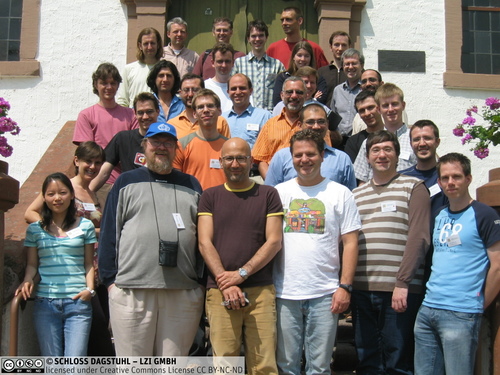Dagstuhl-Seminar 06261
Foundations and Practice of Programming Multi-Agent Systems
( 25. Jun – 30. Jun, 2006 )
Permalink
Organisatoren
- Rafael H. Bordini (Federal University of Rio Grande do Sul, BR)
- Mehdi Dastani (Utrecht University, NL)
- John-Jules Ch. Meyer (Utrecht University, NL)
Kontakt
The “Foundations and Practice of Programming Multi-Agent Systems” Dagstuhl Seminar aimed at bringing together researchers interested in programming languages for multi-agent systems, agent-oriented software engineering, and various related aspects such as verification, and formal semantics. We were delighted with the result of this seminar, which gave participants a clear view of the most advanced techniques being currently investigated in research on those topics throughout the world, and also a clear understanding of all the most important open problems that need to be addressed by this research community. The seminar was particularly successful in elucidating the relationship between work being done by the “programming languages for multi-agent systems” (ProMAS) research community and the “agent-oriented software engineering” (AOSE) research community. Even though the initiative for this seminar arose from the ProMAS community, we were delighted to attract many prominent researches from the AOSE community, which allowed us to achieve the positive result on the connection of ProMAS and AOSE research.
In order to achieve the most productive setting for technical presentations and discussion in the various aspects we wanted to cover, we structured the talks in thematic days or half-days. In the first and last days, we included only AOSE-related talks. The second day was dedicated to ProMAS specifically, the morning of the third day we dedicated to Verification of Multi-Agent Systems; the fourth day had talks on Semantics in the morning and AOSE in the afternoon.
There were three discussion sessions, on the following general topics:
- agent-oriented software engineering;
- programming multi-agent systems;
- semantics and verification.
It was in the discussion sessions that many interesting ideas emerged. We were fortunate to have Maarten Sierhuis generating a detailed report of all dicussions using the Compendium Tool (http://www.compendiuminstitute.org/tools/compendium.htm). He also kindly agreed to make the Compendium diagrams available online, which provides a complete report of all discussion sessions, so we feel it is not necessary to include that material in this summary. The interested reader will find all the details about the discussions we had at the following URL: http://www.dur.ac.uk/r.bordini/Dagstuhl06261/ (choose “Discussions” in the main menu).
From the discussion session, we just would like to add a list of agent programming languages currently being used in university courses taught by the participants. The growing number of universities teaching agent-oriented programming languages is a clear indication of the increased maturity of the area and an excellent promise for a major growth of the paradigm in the medium term.
Anyone who has attended a Dagstuhl seminar agrees that Dagstuhl seminars are the most productive of all types of academic events. We were certainly expecting an excellent seminar, but this seminar exceeded our expectations in all aspects. With so many issues still to be resolved in this exciting and promising area of research, we are hoping that a follow up of this seminar will be organised in a couple of years, and we are looking forward to it already!
- Matteo Baldoni (University of Turin, IT) [dblp]
- Guido Boella (University of Turin, IT) [dblp]
- Olivier Boissier (Ecole des Mines - St. Etienne, FR) [dblp]
- Rafael H. Bordini (Federal University of Rio Grande do Sul, BR) [dblp]
- Lars Braubach (Universität Hamburg, DE) [dblp]
- Jan M. Broersen (Utrecht University, NL) [dblp]
- Mehdi Dastani (Utrecht University, NL) [dblp]
- Jorge J. Gomez-Sanz (University Complutense - Madrid, ES) [dblp]
- Koen V. Hindriks (TU Delft, NL) [dblp]
- Benjamin Hirsch (TU Berlin, DE)
- Jomi Fred Hübner (Ecole des Mines - St. Etienne, FR) [dblp]
- Wojtek Jamroga (University of Luxembourg, LU) [dblp]
- Catholijn M. Jonker (TU Delft, NL) [dblp]
- Winfried Lamersdorf (Universität Hamburg, DE) [dblp]
- João A. Leite (Universidade Nova de Lisboa, PT) [dblp]
- Alessio R. Lomuscio (Imperial College London, GB) [dblp]
- Viviana Mascardi (University of Genova, IT) [dblp]
- John-Jules Ch. Meyer (Utrecht University, NL) [dblp]
- Matthias Nickles (University of Bath, GB)
- Peter Novák (TU Clausthal, DE) [dblp]
- Alexander Pokahr (Universität Hamburg, DE) [dblp]
- Alessandro Ricci (University of Bologna, IT) [dblp]
- Sebastian Sardiña (RMIT University - Melbourne, AU) [dblp]
- Steven Shapiro (University of Toronto, CA)
- Maarten Sierhuis (NASA / RIACS - Moffett Field, US) [dblp]
- Leon Sterling (The University of Melbourne, AU)
- Bas Steunebrink (Utrecht University, NL)
- Leon van der Torre (University of Luxembourg, LU) [dblp]
- Birna Van Riemsdijk (LMU München, DE) [dblp]
- Michael Winikoff (RMIT University - Melbourne, AU) [dblp]
- Yingqian Zhang (TU Delft, NL) [dblp]
Verwandte Seminare
Klassifikation
- artificial intelligence / robotics
- programming languages / compiler
- sw-engineering
- semantics / formal methods
- verification / logic
Schlagworte
- Agent-oriented programming
- Agent-oriented software engineering
- Multi-agent implementation languages
- Agent development tools and platforms
- Semantics of agent-oriented languages
- Specification and verification of multi-agent systems
- Theories of multi-agent programming


